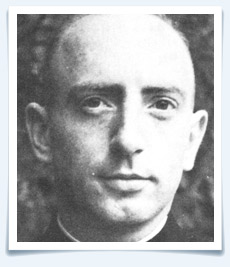Eduard Müller
Portrait
During one interrogation by the Gestapo, he remarked that in reality he regarded himself as “actually nonpolitical”. But what means “nonpolitical” in a totalitarian regime? Similar to Prassek, he had the dark foreboding after his ordination in 1940 that he would surely get to know the inside of a KZ (Concentration Camp) one day.
Born in Neumünster in 1911 as the youngest of seven children, he had a meagre youth. The father had left the family and only paid alimony on rare occasions, his devout mother made a living by taking in laundry and working as a char woman. After finishing elementary school he completed an apprenticeship as a cabinet-maker. He already at that time felt the desire to become a priest. These talents had been recognised earlier by his one time school-mistress and his parish priest. They provided him with private tuition and organised financial sponsorships from Catholic patrons. He entered the Institute for Late Vocations “St. Clemens” near Driburg, where he attained his high-school-leaving certificate. While there, he always felt somewhat humiliated for being without means and dependent on others; but he persisted and went on. Having matriculated in 1935, he studied theology. A few weeks after his ordination as a priest, he took on his first posting in Lübeck.
While there he took care of the boys’ group, 10 years and up, as well as a group catering for unmarried young men. His activities with youths were so successful, that leaders of the Lübeck HJ (Hitler Youth) tried to engage him for their programs, however, they were not successful in recruiting him. Müller consciously structured his work as a counter to that of the HJ. His excursions into the Lübeck environs on Sunday mornings after mass were in direct opposition to HJ activities. His friendly and un-authoritarian manner was in contrast to that of the HJ leadership. Youths admired him. He was also held in high regard by tradesmen and labourers, as he would always lend a hand, when help was needed.
He took part in the copying and distribution of literature critical of the regime and allowed discussions, critical of the regime, during group meetings with young men. Müller never lost his gentleness, not even in the clutches of NS-Justice. Fellow prisoners and his cell-neighbour Stephan Pfürtner writes: “I think I shall never forget his calm gentle eyes: How they would wink me a ‘Good Morning’ in the early hours and in the evening a ‘Good Night’, I guess he was unable to even hurt a fly”. Eduard Müller’s short life as a priest was in itself decidedly contradictory to the prevailing ideology of cruelty, hatred and violence.
Original GermanText: Ökumenischer Arbeitskreis „Lübecker Märtyrer“
English Translation: Hans-Heinrich Boeker, Wyoming, Australia










